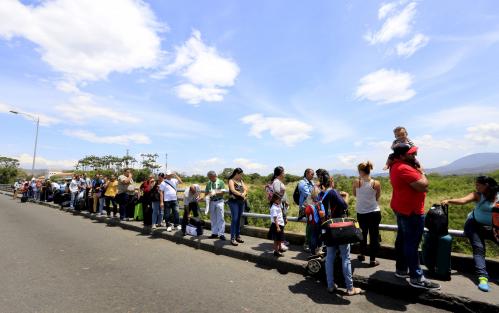This piece was adapted from an op-ed originally published by The Hill.
The ongoing massive exodus of Venezuelans into neighboring Colombia and other South American countries has the potential to become the largest refugee crisis since the eruption of the Syrian civil war.
Precise statistics are so far unknown, as a large proportion of the Venezuelans that cross the land border into Colombia and Brazil do so illegally. Many of them lack passports and other forms of documentation. While official figures place the number of Venezuelan residents in Colombia at 600,000, observers on the ground estimate that the real number is significantly higher. Unofficial sources put the total number of Venezuelans who have fled the country since 1999 somewhere between 2 million to 4 million—about 7 to 13 percent of the population—with the vast majority coming after 2014.
The costs of hosting such a large number of refugees can be quite significant. Border communities and budgets in receiving cities are already showing signs of strain. In the case of Syria, the international community was highly committed to mobilizing resources to assist refugees and their host countries. The opposite has happened with Venezuela. As Colombia and the rest of South America struggle with the massive daily influx of Venezuelans, the response from the international community has been largely muted. There hasn’t even been a discussion on the possible costs of resettling these refugees, let alone on a fair and appropriate burden sharing.
In part, this is because the international community has yet to formally embrace fleeing Venezuelans as refugees. However, under international law (specifically, the 1984 Cartagena Declaration on Refugees) and in light of the ongoing humanitarian crisis, the government’s incessant attacks on the rule of law, and the continued erosion of freedom and democracy, the case for doing so is clear-cut.
But legal definition aside, another reason why the discussion isn’t taking place is that exact figures on the costs of resettling refugees are hard to come by. Some back-of-the-envelope calculations may help clarify the magnitudes involved. Estimates of the cost of hosting just one Syrian refugee for one year in Germany, Turkey, and Jordan (three of the largest recipients) range between around $3,000 and $10,000. These figures include the provision of basic services such as housing, food, and health care. After adjusting for differences in cost of living, in South America these costs will hover between $2,000 and $6,500, depending on the host country. In Colombia, for example, the annual cost would be between $2,500 and $5,000. In the rest of South America, the average cost would be about $1,000 more.
Let’s assume a scenario in which 1 million Venezuelan refugees flee the country in 2018. Suppose that half of these migrants seek refuge in Colombia, and the other half spread out across the rest of South America. In this case, the total cost of resettling the refugees would be between about $2.8 billion and $5.2 billion (see interactive figure below). For reference purposes, in 2017 the Jordan government spent an estimated $1.7 billion to host some 650,000 Syrian refugees.
The Venezuelan refugee crisis has taken on global proportions, and its costs should not be borne by its regional neighbors alone: The international community has a responsibility to protect the world’s migrants and refugees and support the countries that assist them. It acknowledged as much when it adopted the New York Declaration for Refugees and Migrants by consensus at the 2016 United Nations Summit. Given the abject failure to date of efforts to encourage a restoration of constitutional order and democracy within Venezuela—a necessary first step to stem the humanitarian crisis—the world must now focus its resources on mitigating the effects of the crisis by supporting refugees and their host countries.
It is up to the international community, including the U.N. system, international financial institutions, and other private, public, and multilateral stakeholders, to work together to mobilize the necessary resources and chart a fair and robust collective response to the crisis that will provide relief to suffering Venezuelans fleeing their country.
The Brookings Institution is committed to quality, independence, and impact.
We are supported by a diverse array of funders. In line with our values and policies, each Brookings publication represents the sole views of its author(s).








Commentary
Op-edNeighbor nations can’t bear costs of Venezuelan refugee crisis alone
March 7, 2018